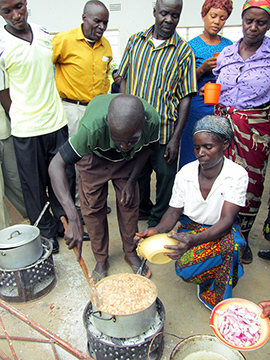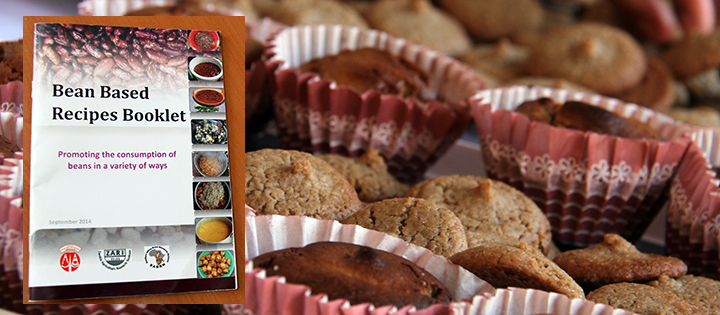A Zambian book containing recipes for healthy bean-based meals is now available online.
The book, created by the National Food and Nutrition Commission (NFNC) and Zambian Agricultural Research Centre (ZARI) in partnership with the Pan-Africa Bean Research Alliance (PABRA) in 2014, was developed to aide health extension workers in their efforts to improve nutrition and health across the country.
It has been adapted from a recipe book published by the International Center for Tropical Agriculture (CIAT) and is being used to promote the increased consumption of beans among vulnerable populations, particularly pregnant and lactating women and young children under two.
Despite the high nutritive value of beans in terms of energy, protein and micronutrient content, young children don’t get their full nutrition benefit because they are often prepared in a form that they are unable to eat. The book, which only uses locally-available produce, includes a variety of purees and porridges suitable for young children other groups that are not able to eat solid food.
Extension officers use the book in conjunction with nutrition education and good water, sanitation and health (WaSH) practices. It helps them provide step by step instructions to communities and households on how to prepare and consume all types of beans using various recipes.
 Beans are an important source of energy, protein, fibre, vitamins and minerals and provide as many as three harvests a year.
Beans are an important source of energy, protein, fibre, vitamins and minerals and provide as many as three harvests a year.
Any type of common bean can be used in the recipes, but researchers recommend a variety called Mbereshi. Mbereshi is a biofortified bean variety that was released in Zambia by ZARI.
Producing beans with high levels of iron and zinc – a process known as biofortification can help address malnutrition which affects the poorest people. “Biofortified” beans – bred to contain higher nutrient content – through participatory breeding by farmers and researchers, contain more than double the iron and more zinc than regular beans.
Through PABRA, CIAT has developed over 40 biofortified beans in partnership with HarvestPlus. More than 10 countries in Sub-Saharan Africa have released biofortified bean varieties, including Zambia.
Find out more about our Nutrition work.


Dear Sir/Madam
I would first like to congratulate your good work posted in this website. very informative and helpful in many ways, aspecially for me.
I work as a food technologist in Lesotho at the department of Agricultural Research. I have also recently been working on a project ‘Development of biofortified bean products for children under five years”. We are yet to launch such our booklet sometime in April 2017.
I wanted to download the Zambia work on ‘Bean Based Recipe booklet” from this website but however i failed on numerous occasions.
Could you kindly send me a soft-copy for my reference for later use in promoting the use of beans in my country. I will highly appreciate your help . Thank you